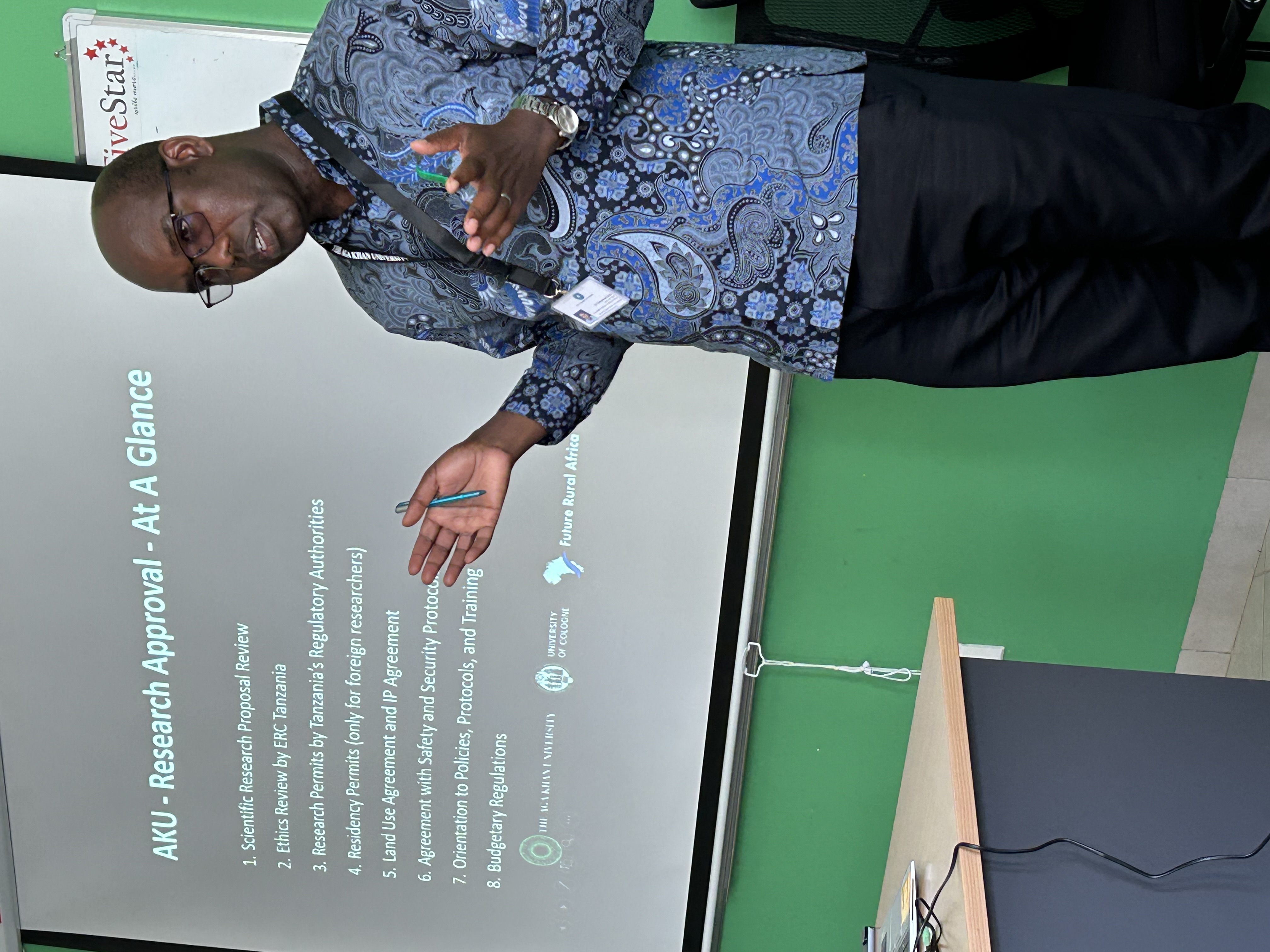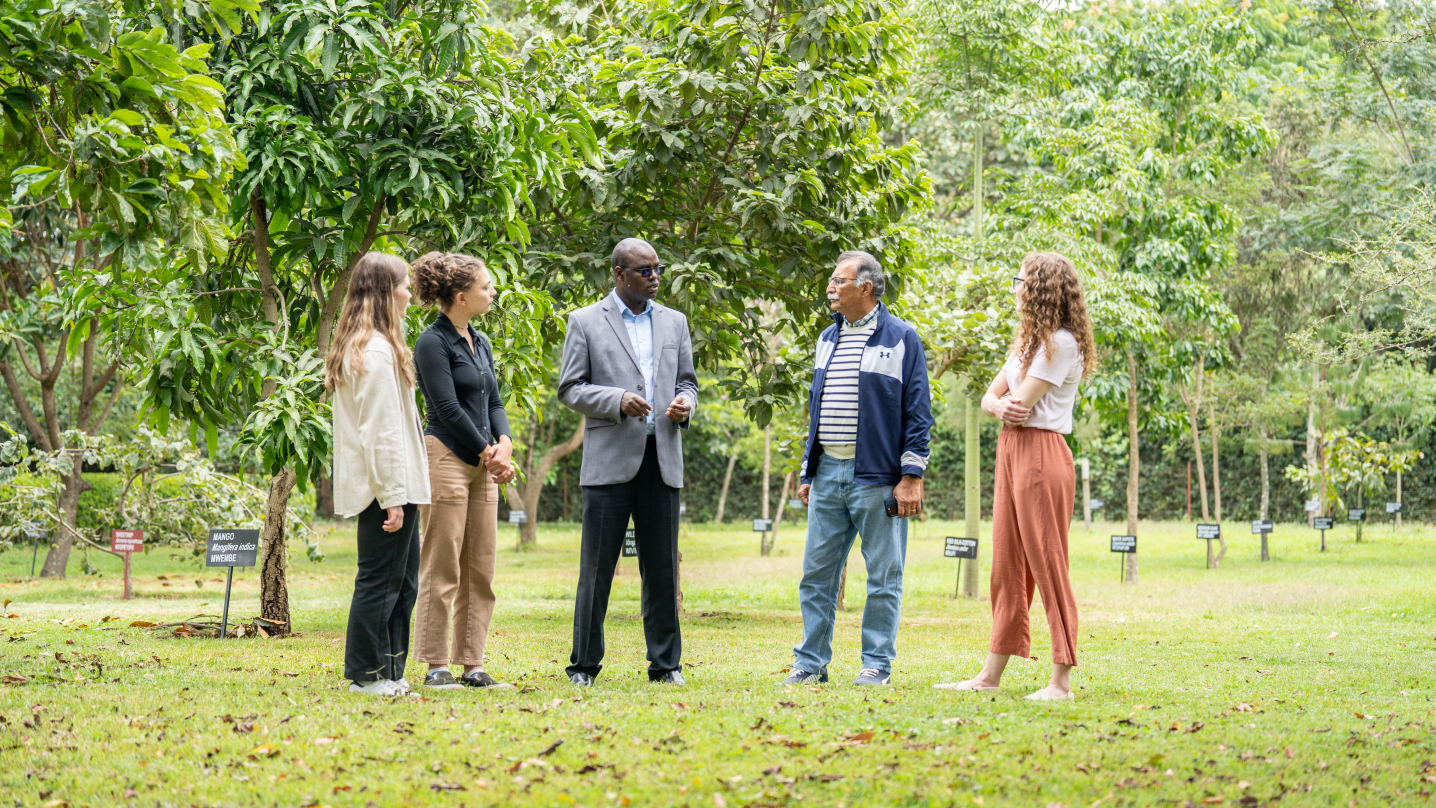Arusha Climate and Environmental Research (ACER) Centre - Dr Emmanuel Sulle

Dr Emmanuel Sulle works as an Assistant Professor, Faculty of Arts and Sciences, Karachi and is the Director, Research at AKU Arusha. He leads the recently established AKU Arusha Climate and Environmental Research (ACER) Centre. The Office of Environment and Sustainability interviewed him to discuss his background, work, and ideas.
What made you interested in sustainability?
My background is multidisciplinary, and my research is interdisciplinary. I got my first degree in economics here in Tanzania after which I decided to undertake a master’s from the US in Public Policy, majoring in Environmental Policy. I also completed a PhD in Poverty, Land and Agrarian Studies from South Africa. My background studies are really suitable for the work that I'm doing and envisioning to do here at AKU-ACER. I was born in Mbulu district, which was part of Arusha region, before it was subdivided to form a new Manyara Region. Therefore, I’m happy to be back and working in my home city.
What does your current work entail? What does an average day look like for you?
I oversee all the research activities undertaken at Arusha and have contributed to initiating this research centre. My work entails designing, implementing research projects and disseminating research findings. I also ensure all research projects we commission and or collaborate on meet the national priorities, policies, and guidelines as well as securing research permits for Arusha-based projects. Furthermore, I work on creating relationships and partnerships with national and international universities and other relevant entities.
We have managed to get a first international partnership with the Simon Fraser University in Canada. Locally, we have signed an MOU with the Nelson Mandela Institution of Science and Technology, which has given us access to their labs, and with the Tanzania Wildlife Research Institute, which is the sole government entity dealing with research and research permits relating to wildlife and biodiversity in the country. In addition, we have advanced on signing an MOU with the University of Cologne in Germany and are about to sign MOUs with two major universities in Tanzania (University of Dar es Salaam and Sokoine University of Agriculture).
Every day I think about what proposals we are writing, what reporting I need to do, how to collaborate with the facilities’ team and communicate with our partner universities. That's my daily routine and I’m hoping to take on the additional task of teaching in the next few months.
What would you say your one achievement on sustainability has been so far?
I think one of the achievements in sustainability is the large dataset we have for pollinators and the additional data set we will be gathering for soil and land health as well as the biodiversity assessment which have also commissioned.
I'm saying that the database is an achievement because we cannot assess progress if we don't have a baseline. The baseline will allow us to monitor the status of pollinators, biodiversity and soil and land health over time. To me, that's the starting point for major publications. All of these research work and publications will lead to more visibility for the Aga Khan University and to showcase tangible impacts of our work.
What is the strategic importance of Arusha for environmental sustainability?
The land has a lot of ecological importance, and we want to make Arusha a living laboratory for community-driven research informed by local and indigenous knowledge. This could be a place where we collaborate and share learnings with the broader AKDN network.
I believe Arusha can also be a source of policy and culture change within AKU. For example, we are brainstorming on work friendly policies enabling people to work from home as we endeavor to cut our carbon footprint, improving productivity, and reducing our paper and plastic waste. With the current climate related threats to humanity, we can no longer keep operating on business-as-usual mode.
What are some of the challenges that you face in implementation?
One, of course, is the shortage of adequate resources such as personnel and funding which the university is working hard to address it and we too, are vigorously writing grants. Then the other challenge is to ensure our activities here in Arusha Campus are informed by research and I do hope we can overcome this challenge by avoiding working in silos. We will create environment where people should feel free to reach out to someone to share their ideas and spark a conversation.
What is your personal motivation to work on sustainability? Who inspires you?
My belief is that our future depends on how we integrate our daily activities with sustainability thinking. We must incorporate sustainability in everything we do and that's what keeps me motivated.
I draw a lot of inspiration from Wangari Maathai whom I met back in 2008. Since then, I have read lots of her work. Also Thomas Hilde from the University of Maryland, was inspirational. He taught me the subject of Sustainability. Tom was exceptional because in addition to teaching theory at the university, he took students to ecologically sensitive areas in Indonesia and Peru to practically see sustainable agriculture projects and rural livelihoods. Inspired by these great sustainability leaders, I have co-designed a field school in Arusha on climate and resilience in collaboration with Prof David Zandvliet at Simon Fraser University, which will start in October/November 2023. The field school programme also offers an opportunity to engage other AKU campuses to bring their students to Arusha for experiential learning and hands-on experience in community and local environmental and sustainability issues.

What makes you hopeful about your work and the sustainability work that AKU is doing?
I think there's so many things that make me happy. Let me mention three core reasons.
One is that AKU is committed to sustainability. Second, there's clear direction from top leadership to achieve net zero. That gives me hope. And third, we have a clear vision and strong partnerships with our local and global partners for environmental research.

